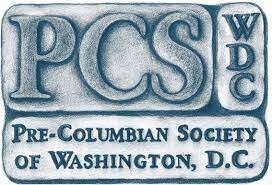The Large Wari Khipu at Dumbarton Oaks: Preliminary Analysis of a Cord-Constructed Document
Jeffrey C. Splitstoser, PhD, George Washington University
This meeting will be held at the Charles Sumner School, 17th & M Streets, N.W., Washington, D.C.
NOTE: Photo ID may be required to enter the building.
The meeting will start with refreshments at 6:45 pm and the lecture will begin at 7:15 pm.
Khipus—string devices that employ color, knots, and position to record information—were in all likelihood developed by the Wari (ca. 600–1000 CE) as an administrative aid for running their empire, which was South America’s first. Khipus were still in use by the Inkas whose empire flourished 500 years after the fall of the Wari. Much of what we know about Inka khipus comes from court translations and first-hand written accounts of their use.
Large Wari khipu at Dumbarton Oaks, PC.WBC.2016.068, courtesy of the Dumbarton Oaks Museum
Unfortunately, no primary information exists for Wari khipus, so our understanding of them must come from either inference from what is known about Inka and later khipus or from deductions made from thorough studies of archaeological Wari khipus, their contexts, and associations (when they exist). My study of Wari khipus indicates that Wari, Inka, and post-Inka khipus share many, if not most, of the same attributes, suggesting that the recent breakthroughs in our understanding of Inka, Colonial, and Republican khipus may also be applicable to Wari khipus.
This talk will focus on a large Wari khipu donated to the Dumbarton Oaks by Barbara and William Conklin in 2016. It is the largest known Wari khipu, consisting of approximately 1,000 colored, wrapped, and knotted cords, and its cords contain most if not all of the significant attributes used to encode information in Wari, Inka, and post-Inka khipu traditions. As such, the “large Wari khipu,” or LWK, makes an ideal subject for discussing what we know about Wari khipus and how they might have encoded information..
Dr. Jeffrey C. Splitstoser is an Assistant Research Professor of Anthropology at George Washington University. He is also a research associate of the Institute of Andean Studies, Berkeley, and a Cosmos Club scholar. Splitstoser was a Junior Fellow at the Dumbarton Oaks (2005‒2006). As a specialist in ancient Andean textiles, he is part of the Castillo de Huarmey archaeological project, which is excavating Wari textiles and khipus (see the June 2014 issue of National Geographic Magazine). Splitstoser recently received notoriety as the textile specialist for the Huaca Prieta Archaeological Project, directed by Dr. Tom Dillehay, where he studied 6,200 year old cotton textiles dyed with the world’s earliest known use of indigo. He received his Master’s degree (1999) and Ph.D. (2009) in anthropology from The Catholic University of America, Washington, D.C. His dissertation is a study of the Early Paracas textiles from Cerrillos in the Ica Valley of Peru. Splitstoser was appointed by Dr. George E. Stuart to serve as Vice President of the Boundary End Center (BEC), a research facility and retreat in western North Carolina, and editor of its two peer-reviewed journals, Ancient America and the Research Reports on Ancient Maya Writing .


